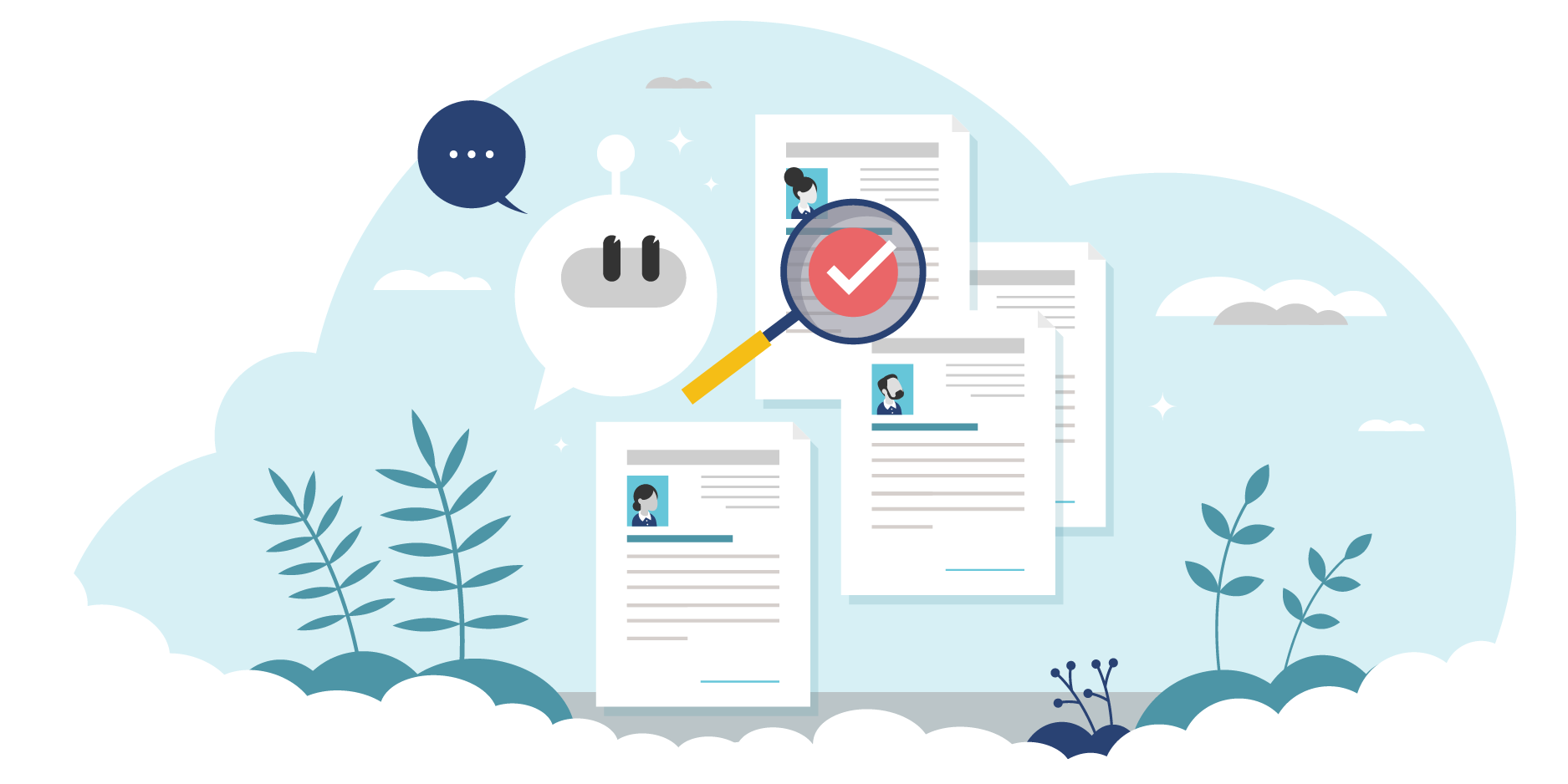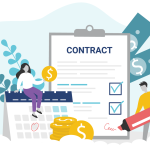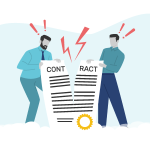AI in Staffing: Key Risks & How to Manage Them
August 8, 2025

From screening resumes to scheduling interviews, artificial intelligence is rapidly transforming the way Staffing & Recruitment firms operate. These technologies promise faster workflows, improved candidate matching, and greater scalability, offering a competitive edge in a tight talent market.

But as more firms turn to AI-powered tools to engage candidates, they may also be opening the door to legal, ethical, and operational vulnerabilities. From algorithmic bias and data breaches to regulatory non-compliance and reputational fallout, the challenges are complex—and evolving.
So, what are the risks facing Staffing & Recruitment firms when it comes to AI implementation? And what strategies can you adopt to protect your organization? Keep reading to learn more.
What are the risks?
1. Algorithmic Bias and Discrimination
AI hiring tools can unintentionally replicate and amplify existing prejudices by relying on historical data to make decisions—data that often reflects systemic inequalities or biased hiring patterns. As a result, staffing firms may unknowingly deploy tools that disadvantage certain candidates, exposing your firm to legal and ethical challenges related to DEI (Diversity, Equity & Inclusion) and human rights.
Real-world examples of this have made headlines for years—in 2018, Amazon discontinued an internal AI recruitment tool after it was found to favour male candidates over equally qualified female applicants. More recently, Workday faced a discrimination lawsuit alleging that its AI-powered hiring software systematically screened out applicants over the age of 40.
2. Lack of Transparency and Accountability
Many AI hiring tools operate as “black-box” systems, meaning their decision-making processes aren’t easily understood—even by those who implement them. These models analyze vast amounts of data to produce recommendations or decisions, but they often can’t provide clear explanations for why certain candidates are advanced or rejected.
A lack of clarity can diminish internal trust in the tool and external confidence among candidates and clients. Without clear accountability mechanisms, firms risk being unable to defend their processes if challenged, whether by regulators, clients, or candidates themselves.
3. Regulatory and Legal Exposure
Canada’s regulatory landscape is evolving to address the use of AI in hiring processes. While specific federal legislation is still under development, existing and proposed laws have significant implications:
- Bill C-27: Introduced in 2022, this bill encompasses the Artificial Intelligence and Data Act (AIDA) and the Consumer Privacy Protection Act (CPPA). AIDA aims to regulate “high-impact” AI systems, including those used in employment decisions, by establishing requirements for risk management, transparency, and accountability. Non-compliance could lead to substantial penalties.
- PIPEDA: The Personal Information Protection and Electronic Documents Act governs how private-sector organizations collect, use, and disclose personal information in commercial activities. Staffing firms must ensure that AI tools handling candidate data comply with PIPEDA’s consent and transparency requirements.
- Provincial Laws: Provinces like Quebec have enacted their own privacy legislation. Quebec’s Law 25 mandates that individuals be informed when decisions are made exclusively through automated processing and have the right to request human intervention. This has a major impact on AI-driven hiring practices within the province. Learn more here.
- Human Rights Legislation: Both federal and provincial human rights laws prohibit discrimination in employment. If AI systems inadvertently disadvantage protected groups, organizations could face legal challenges.
Implementing AI tools requires careful consideration to maintain fair hiring practices and uphold candidates’ rights. Proactive engagement with legal and HR teams is crucial to navigate the complexities of AI regulation and mitigate potential risks.
4. Data Privacy and Cybersecurity Risk
AI tools often rely on cloud-based platforms and third-party vendors. Since they’re typically granted direct access to your data libraries, a breach in the AI platform could expose your most sensitive information. Without strong vendor management and robust security protocols in place, these tools can become potential vectors for cyberattacks—especially if systems aren’t properly encrypted, segmented, or regularly audited.
A breach involving personal information—such as resumes, banking information, assessment results, or interview recordings—can be devastating. Beyond the immediate financial costs of regulatory fines and breach response, the loss of trust among clients, candidates, and the public can derail existing relationships and impede future business growth.
RELATED: Data Breaches: How Staffing Firms Can Prepare for Unexpected Lawsuits
5. Overdependence on AI
As teams lean more heavily on AI-driven processes, core recruitment skills—such as critical thinking, relationship-building, and human judgment—can erode over time. This dependence also increases operational vulnerabilities: a sudden technology failure, system outage, or vendor issue could disrupt talent pipelines and stall placements entirely.
RELATED: Artificial Intelligence: Asset or Byte of Trouble for Your Business?
6. Brand and Relationship Risk
Misuse or failure of AI tools, particularly when perceived as impersonal, unfair, or overly automated, can damage your firm’s image with candidates, clients, and even regulators.
For candidates, AI-driven communication, like chatbots or automated emails, can feel cold and transactional, eroding the personal touch that many job seekers expect. A poor candidate experience can lead to high drop-off rates, negative reviews, and damage to your brand.
Similarly, for clients, visible missteps can raise doubts about your firm’s professionalism and judgment, like poor placements from automated assessments that fail to take nuanced qualities like adaptability, emotional intelligence, or team fit into account. In a relationship-driven business, loss of trust is difficult to rebuild.
Ultimately, reputation is your firm’s most valuable asset. AI must be implemented carefully and transparently to avoid weakening the very relationships that drive your success.
7. Potential Insurance Implications
If your firm is using AI in your recruitment services, especially for decision-making or client-facing activities, it’s important to consider how your risk profile could be affected. While using AI doesn’t automatically change your insurance coverage, it can introduce new exposures that weren’t originally factored into your policy.
For instance, if an AI tool contributes to a data breach, makes a discriminatory decision, or misplaces a candidate, your firm could face legal, financial, or reputational consequences. In these cases, coverage gaps could arise if you haven’t kept your insurer in the loop about the evolving nature of your operations.
PRO Tips: What can you do?
In a relationship-driven industry where trust, fairness, and compliance are paramount, staffing firms can’t afford to overlook the implications of AI. As regulations evolve and public scrutiny grows, it’s more important than ever to review your risk management strategy and insurance coverage to ensure they reflect how you’re using AI.
Looking to integrate AI safely and strategically? Here are our top tips to help you minimize risk and position your firm for long-term success.
1. Look before you leap.
Whether your firm is in the early stages of exploring AI or has already integrated it into daily operations, it’s essential to conduct thorough due diligence. Be sure to:
- Define your engagement level. Determine how extensively you want to leverage AI and set specific goals and objectives.
- Before adopting any third-party tools using AI, vet the vendor’s expertise, reputation, commitment to transparency, and contractual terms—and thoroughly test the tool’s processes.
- Involve DEI and legal experts early in the implementation process to prevent bias (perceived or real) that could damage your reputation and client relationships in the staffing industry.
Once your risks have been identified, you can then develop tailored strategies to manage and contain them.
2. Transparency is key.
As AI becomes more integrated into the hiring process, regulatory scrutiny is increasing—especially around how these tools influence employment decisions. To maintain candidate trust and reduce legal exposure, be sure to:
- Stay up-to-date on regulatory developments to ensure that AI systems used in hiring are auditable, transparent, and compliant with Canadian laws.
- Be proactive in updating consent language and candidate communication templates to disclose how AI tools are used in hiring decisions—what data is collected, how it’s analyzed, and how results impact selection.
- Clear, human-readable explanations of how AI is used in hiring will become a trust-building differentiator.
- Manage candidate expectations by acknowledging what your AI tools can and can’t do. For example, make it clear if AI is only used to pre-screen resumes, but final decisions are made by a human recruiter.
In a people-first industry, prioritizing transparency is more than just a legal safeguard. Firms that demonstrate fairness, accountability, and openness in their processes will have a competitive advantage, earning greater trust from candidates, clients, and regulators alike.
PRO TIP: Even with responsible AI practices, there’s always the risk of perceived or actual bias, data mishandling, or wrongful exclusion—any of which could lead to legal action. That’s where insurance comes in. Consider investing in:
- Professional Liability Insurance: This coverage protects your business from accusations of errors, omissions, or negligence committed within the scope of your professional activities, including errors linked to your use of AI systems. Learn more here.
- Directors & Officers (D&O) Insurance: This policy can play a crucial role when allegations of third-party discrimination are made—defending allegations related to bias or unfair recruitment and hiring practices related to your implementation of AI technology. Learn more here.
3. Ensure human oversight.
No matter how advanced AI becomes, human oversight must remain at the core of ethical and effective recruitment. Staffing firms should never rely solely on algorithms to make hiring decisions. Instead, it’s essential to:
- Train your team to understand how AI tools work, including their limitations, risks, and appropriate use cases.
- Create clear policies and accountability frameworks that define where human intervention is required—particularly in decisions related to candidate screening, rejection, or advancement.
- Establish clear documentation protocols to track AI-driven decisions, human interventions, and final outcomes.
- Conduct regular reviews and audits to assess whether AI decisions align with your firm’s values, compliance obligations, and DEI goals.
- Foster a culture of curiosity and caution, where staff are encouraged to question AI outputs and prioritize human judgment.
AI should assist—not replace—human expertise, especially when the stakes involve people’s careers, reputations, and livelihoods.
PRO Tip: To further protect your firm, consider investing in:
- Directors & Officers (D&O) Insurance: As AI tools become more deeply integrated into recruitment operations, executives may face greater scrutiny over decisions related to ethics, compliance, and data governance. D&O Insurance defends your business leaders if they’re personally sued for any actual or alleged wrongful acts in managing the company, such as poor governance, failure to act, financial losses, misallocation of funds, operational failures, and more. Learn more here.
- Employment Practices Liability (EPL) Insurance: AI-driven hiring can unintentionally lead to biased decisions, unfair screening practices, or perceived discrimination—even if you didn’t design the algorithm. EPL Insurance (including the addition of Third Party coverage) protects your business from employment-related claims, including wrongful termination, harassment, and discrimination, whether caused by human actions or AI-assisted processes. Learn more here.
Together, these coverages help manage the complex liabilities staffing firms face in today’s AI-driven hiring environment, and offset the significant financial costs these liabilities present to your balance sheet.
4. Strengthen your cyber defences.
Staffing & Recruitment firms handle an enormous volume of sensitive personal data—from resumes and background checks to social insurance numbers and direct deposit details. And with the growing use of AI-powered tools for sourcing, screening, and engaging candidates, your digital infrastructure is becoming even more vulnerable.
To reduce your risk, ensure your team follows these essential cybersecurity practices:
- Use strong, unique passwords and update them regularly;
- Enable multi-factor authentication (MFA) wherever possible, especially for administrative access;
- Restrict access to sensitive data on a need-to-know basis;
- Keep all software, firewalls, and antivirus programs up to date;
- Train staff to identify phishing attempts and social engineering tactics;
- Vet all third-party tools and vendors for security compliance; and
- Consult a cybersecurity expert with experience in AI-hiring tools to provide more specific guidance tailored to your industry.
But even with robust protocols and the best cybersecurity tools in place, no system is foolproof. As your last line of defence, we recommend considering Data Security & Privacy Breach Insurance to protect your business and offset your losses in the event of a breach—like if your company’s information is stolen or exposed by a hacker, third-party service, or accidentally released by an employee. This coverage includes coverage for both first-party expenses (costs incurred by your business following a breach) and third-party events (costs incurred by a third-party who was affected by the breach). Most importantly, this coverage provides you with immediate access to a panel of pre-approved partners who will guide you through the breach process to minimize financial and reputational damage. Learn more here.
RELATED: Data Breaches: How Staffing Firms Can Prepare for Unexpected Lawsuits
5. Review your insurance.
AI can transform how you source, screen, and engage talent, but it can also expose your firm to new risks that your current insurance policies might not cover.
Think of it this way: just one single lawsuit could cost your firm far more than your annual insurance premium. Even if it’s unfounded, legal proceedings can drain time and resources, derail growth, and damage your reputation with both clients and candidates.
That’s why insurance should be part of your risk management strategy from day one—not an afterthought. Whether you’re adopting algorithmic matching tools, AI-driven screening platforms, or conversational chatbots, proactively communicate changes in your operations to your insurance broker. Doing so will help you:
- Verify that you’re covered for AI-related exposures;
- Uncover any gaps, exclusions, or limitations in your policy; and
- Explore additional protections that align with your evolving needs.
For Staffing & Recruitment firms looking to embracing AI, insurance is no longer a nice-to-have—it’s a strategic investment that protects your people, your clients, and your future.
RELATED: Staffing Firms: Your Guide to Insurance Requirements
6. Work with a risk advisor.
Every Staffing & Recruitment firm will experience the impact of AI differently. The right risk management strategy depends on factors like your firm’s size, operations, client base, and the specific AI tools you use.
To navigate these challenges successfully, working with a risk advisor with a deep understanding of the staffing & recruitment industry is key. With over 40 years of experience, a licensed broker like PROLINK can guide you through the evolving AI landscape and help your firm build resilience amid change. Our dedicated advisors will:
- Keep you informed about emerging threats, legislation, and innovations that could affect you and share what steps other firms in your industry are taking;
- Provide you with comprehensive insurance and risk management solutions that align with your business goals and budget;
- Regularly reassess your exposures and readjust your strategy to scale with your leadership, people, and processes.
AI is transforming recruitment by streamlining workflows, enhancing candidate engagement, and expanding your team’s capabilities. With the right partner, you can confidently embrace these changes while mitigating risk and maximizing efficiency. Together, we’ll help you control exposures, optimize costs, and focus on what matters most—building stronger client and candidate relationships.
To learn more, connect with PROLINK today!
PROLINK’s blog posts are general in nature. They do not take into account your personal objectives or financial situation and are not a substitute for professional advice. The specific terms of your policy will always apply. We bear no responsibility for the accuracy, legality, or timeliness of any external content.




